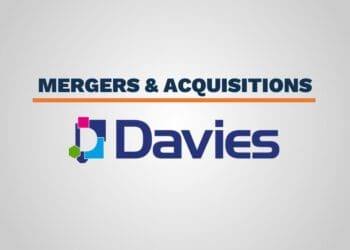Yesterday’s marathon of break-out sessions concluded at 5 p.m. with a virtual “happy hour” of sorts that included a BYOB webcast of a piano-playing singer pounding an electric keyboard, strumming a guitar and taking song requests via chat stream from his (impressively tidy) bedroom.
If it sounds a little weird, it was. But it also was genuinely entertaining in an earnest sort of way, with die-hard conference fans keeping the energy level high via the conference platform’s live chat feature. Proof positive that SCCE can put on a good show (in every sense of the word) and can succeed in an online format when the C&E community shows up with the right attitude.
The technical issues that marred Day One seem to be thoroughly resolved, and the updates logged on social media platforms throughout the day indicate that sessions were enjoyed and presenters and moderators were in fine form.
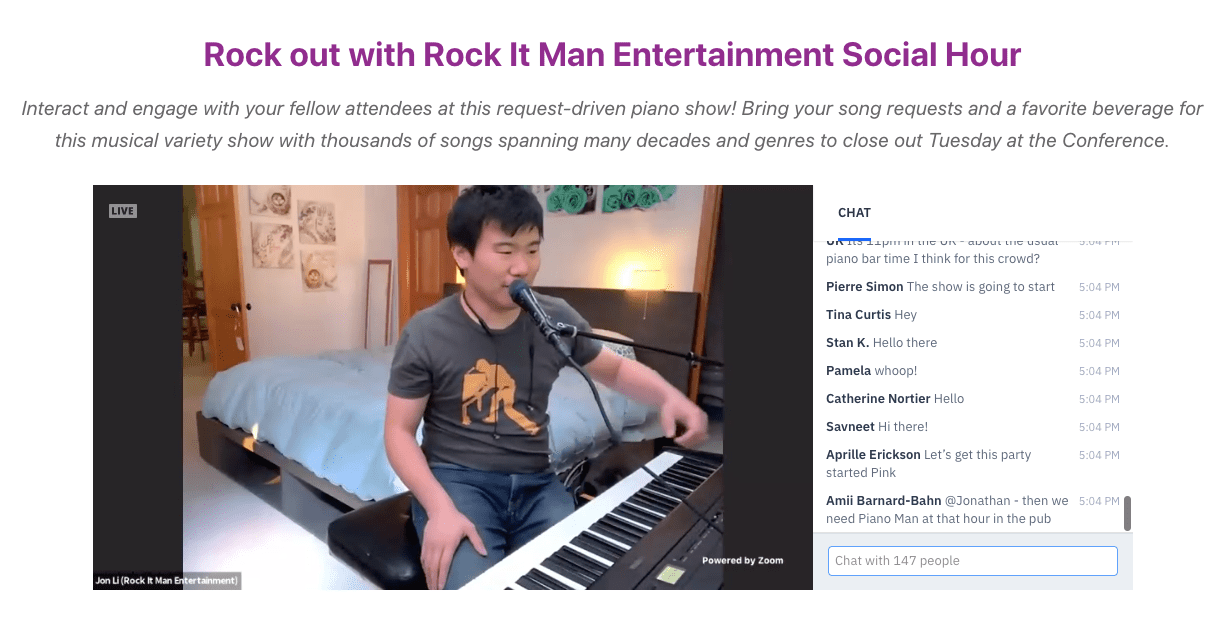
Visit this page all week for live updates, and follow these hashtags on social media for even more commentary:
Chronological updates, most recent are first:
WEDNESDAY
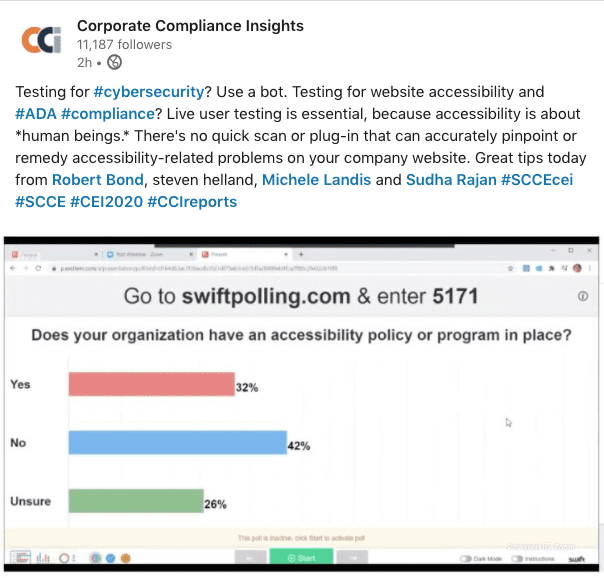
Moving a massive industry conference from in-person to virtual with less than six months’ lead time? What could possibly go wrong? Anything or everything – or maybe just the one thing that planners of virtual events dread most: tech troubles on the Big Day.
Less than 30 minutes before kick-off on Monday morning, thousands of pre-paid registrants attempted to access the conference portal and instead found themselves blinking at blank screens.A mass email from SCCE to registrants around 8:45 a.m. Monday acknowledged the connectivity issue and indicated planners hoped the issues would be corrected “momentarily.”
By 9:07 a.m., a few minutes after the opening remarks were to have been underway, a second mass email from the event team provided an alternate URL to access a scaled-down version of opening remarks, which lacked the interactive chat feature. Problems persisted throughout the morning, as some sessions failed to deliver flawless connectivity.
If event planners lost sleep Sunday night contemplating various worse-case scenarios, was this the nightmare they dreaded?
“Things go wrong. Technology always comes with problems. But yeah, you have to wonder, why us?” said Adam Turteltaub, SCCE and HCCA’s chief engagement and strategy officer, in a phone interview with CCI. “But I think most people realize, especially in this COVD era when we are all doing the best we can, we are all on ground that is not familiar and stable. Things don’t always work out, like when you go to the supermarket and they’re out of paper towels. Some things are just beyond your control.”
By early Tuesday morning another mass email attributed the tech woes to a server issue and provided an alternate URL for platform access. The morning’s opening session proceeded smoothly, including the interactive chat feature.
Calling on past experience with planning and executing large-scale events, Turteltaub said, “It’s not a question of what goes wrong, it’s what you do about it.”
Turteltaub praised his colleagues for smooth, behind-the-scenes teamwork during the crisis.
“When you do over 100 events a year you know everything that can go wrong and you know how to work together as team, which enables us to communicate about the problem while simultaneously working to solve the problem,” he said.
By mid-morning on Tuesday, the more serious connectivity issues seemed to be largely ironed out, though a review of comments via the live chat feature during various sessions revealed some registrants lost sound or audio, albeit briefly in most cases.
Mary Shirley, senior director, ethics & compliance for Fresenius Medical Care North America, was scheduled to co-present a session Monday morning that was heavily impacted by server issues. Shirley said that in the weeks leading up to the virtual event she was less worried about the potential for “systemic” technical problems than about potentially marring the presentation herself due to some sort of user error of her own.
“Jonathan Armstrong (a UK-based attorney with Cordery Compliance) and I were slated in the first tranche of breakouts for the day. Our issues were two-fold, as I understand it.” Shirley said. “First the attendees were unable to enter the virtual room, and we weren’t able to present live. So it seems we were waiting backstage, the audience was waiting at the front door, and the main stage stood empty, waiting for all of us to enter the room. I believe several folks who had intended to join us gave up and instead re-directed their attention to sessions that got up and running before us.”
Shirley said she and Armstrong decided to proceed as planned so that their session could be recorded, and a second session she was scheduled to co-present later in the day was delivered without difficulty.
“We had absolute faith in SCCE that they would ensure that our session would be made available after the event, even if we couldn’t go live,” she said.
A liaison from the production company vendor that SCCE contracted with was in the virtual “room” throughout their session, Shirley said, which helped them navigate the situation and trouble-shoot on the fly.
Both Shirley and other registrants CCI spoke with acknowledged the unexpected benefit of the live chat feature that allows session attendees to post and respond to comments with one another while sessions are taking place. Comments can be public or can be sent to others in the “room” in private mode via direct chat.
“Usually in sessions you’d only chat with people sitting at your table, but the chat function virtually enabled better outreach and discussion between attendees,” Shirley observed. “I think there was more engagement in sessions than there usually is when they’re in person, and I think some of the more shy attendees felt more comfortable using the chat and Q&A option rather than raising their hands, and I’m somewhat speaking from my own experience and mindset there, but I anticipate it applies more broadly.”
Turteltaub echoed Shirley’s chat feature comments.
“It’s interesting seeing the range of comments, from ‘hello from this city’ to commenting on the various topics being addressed and their own experiences and sharing about them,” he said. “In some ways it is really nice that they are doing that. Hopefully it doesn’t distract (from speakers). In many ways it seems to be allowing people to connect in a way that they couldn’t (in an in-person session) other than rudely. Or it may show how much they’d really rather be in a room with each other.”
* * *
(3:30 p.m. Tuesday) — Argentina’s National Anticorruption Plan is supposed to be implemented in the next five years. FUJIFILM’s Patricia Colombo said during this afternoon’s session on compliance programs in Latin America that she is skeptical about whether that will actually happen.
(3 p.m. Tuesday) — 3M’s Tannie Marsh, Cargill’s Christopher Annand and True’s Neha Gupta spent their afternoon panel discussing how to usher in major changes to long-established compliance programs. Companies undergoing systemic changes to their E&C programs, should expect that such changes may be disconcerting to employees and should act accordingly, they explained. When making major changes to their training program, for example, 3M focused on preparing the organization. Employees were told “change is coming, it’s going to look different, there is a huge value to you,” Marsh explained. The messaging calmed employees and allowed the transition process to go smoothly. Cargill took a similar approach when it updated its overall compliance program. “We had this really large change that we were looking to do and one of the areas that we thought we could start introducing the concept of that change to the influencers, stakeholders and leaders was our training program,” Annand said. The compliance department spent time educating the influencers about why the changes were necessary and then relied upon them to spread that information throughout the organization.
(1:15 p.m. Tuesday) — While cases finding CCO’s personally liable for compliance failures are rare, they are certainly not unheard of. To avoid personal liability, CCO’s should focus on documentation and communication with the C-Suite and Board, Michael Henry, Senior Compliance Counsel at Boston Energy Trading and Marketing said during the morning session on CCO liability. Looking at real-life cases, he observed that “One of the reasons CCO’s have been found not liable is that they documented their attempts to address issues.” CCO’s have also been absolved of liability because they presented their CEOs with relevant information, even though the company failed to act on that information.“Lines of communication and commitment of higher-level executives are really important for decreasing liability,” Henry said. Additionally, for a CCO to not be liable, there needs to be independence,” he explained. But that independence can have the side effect of separating the CCO from the company. The best balance “depends on the context and the prevailing structure at the organization,” Henry said. Henry also shared tips on adjusting a compliance program to the Covid-19 era, particularly about responding to a work-from-home culture. If a company had an in-person training program prior to the pandemic, it needs to focus on making up for a loss of contact between the trainers and the employees. If pre-Covid the program was already remote, the company needs to ensure that its messaging continues and that it can cut through all the other topics that are vying for employees’ attention.
MONDAY, Sept. 14
(4:55 p.m. CT Monday) — In response to an incident, Lockheed Martin designed a data-driven approach to evaluating risk at small locations. Douglas Dunham, the company’s Director of Ethics & Business Conduct, shared some of the data points the company considers. For example, the company has a metric that looks at ethics contacts per 1,000 employees per year, Dunham said. If the rate is low, the company believes it may indicate that employees are afraid to contact the compliance department, he explained. The company also considers survey data, information that its compliance team gathers when engaging with employees and the Transparency International Corruption Index score for each of its locations.Data about compliance engagement with a site is also considered. Engagement with a site decreases that site’s composite risk score, Ellen Daly, the company’s Ethics Analysis Senior Manager explained. The company uses several different methods, including physical and virtual engagements and one-way dialogues, to engage employees. Each method is ranked differently, with a physical visit decreasing the risk score more than a virtual one.
(4:40 p.m. CT Monday):
* * *
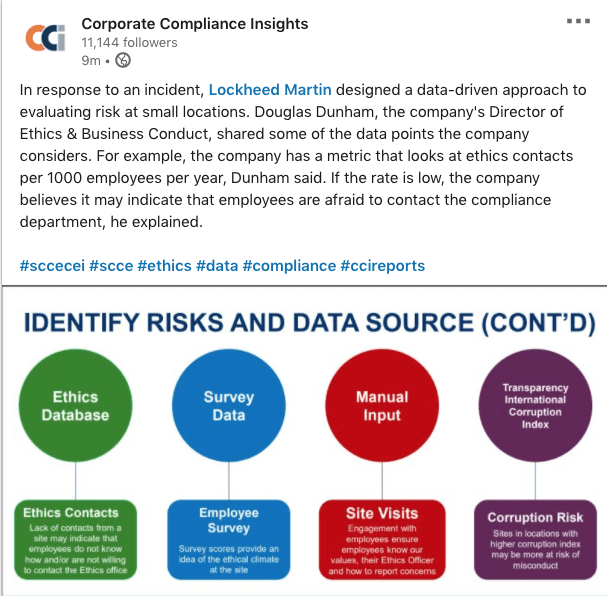
* * *
(4:30 p.m. CT Monday) — Jacki Cheslow says if you’re a compliance officer and “you don’t feel like you have a seat at the table,” then find the people who are leading the planning efforts for Return To Work. “Raise your hand, because that’s where the organization can use your help right now,” and it will help YOU get that seat. Great advice shared during her “Building Organizational Trust” session with co-presenters Ana-Paola Capaldo-Aoun and Raymond C. Justice.
(3:30 p.m. CT Monday) — Recent DOJ guidance makes it clear that “the Pandemic is no excuse” when it comes to corporate compliance, Groupon’s Elizabeth Sheyn Brown said during her session on building a culture of compliance. Kathleen O’Toole, Senior Counsel at McDonald’s, and Brown discussed the specific engagement methods their companies are using to reach employees, ensuring that their company cultures remain strong during the Coranavirus-era. Groupon and McDonald’s both have strong tones at the top of their organizations, Brown and O’Toole reported. Since most of its workforce has moved to working remotely, Groupon’s new CEO has provided many video updates and written updates discussing company values. The Groupon compliance team has mirrored those statements in its own messaging. Similarly, at McDonald’s, the CEO has been releasing “continuous messages” about doing the right thing, O’Toole said. Both companies have also focused on training and messaging throughout their organizations. Strategies they have found successful include: providing targeted training for segments of the company such as executive management or certain functions; using scenario-driven training modules; refreshing and reproducing content that has already been produced; thinking about continuous learning; hosting compliance contests and utilizing compliance champions. Brown said that Groupon often distributes compliance training videos that contain questions at the end. If an employee answers the questions correctly, they are entered to receive a prize which generally consists of money to they can spend on the Groupon website.
* * *
From Monday’s General Session featuring Theranos whistleblower Tyler Shultz:
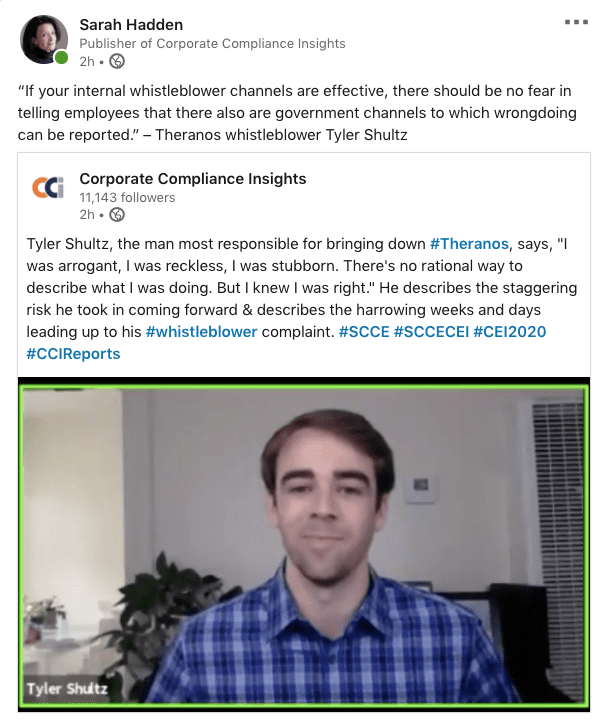
* * *
(12:30 p.m. CT MONDAY) — What’s top of mind for in-house compliance professionals operating in Asia? Mark Stanley, Fresenius Medical Care SVP and General Counsel for Asia Pacific, shared the issues that are keeping him up at night during his presentation covering compliance relations in the region. A few of his biggest concerns include: The disparity of the regulatory environment in Asia; innovative and opportunistic attacks used to transfer value; data breaches; and, of course, the Pandemic. Stanley’s co-panelist, DLA Piper’s Jason Chang, emphasized that companies must still keep track of traditional risks in Asia, such as violations of the FCPA and other anti-corruption laws.One way to mitigate risk is to create a compliance program tailored to Asian operations. Jimmy Chatsuthpihan, Director, Compliance & Ethics APAC, Uber Technologies, suggested several steps a company can take to “regionalize” its compliance program. Having an Asia-based compliance officer is useful, he said. As is understanding local distrust of the compliance function and local attitudes towards corruption and conflicts of interest. Chatsuthpihan also suggested considering the use of creative incentives, events and communication.
(11:49 a.m. CT MONDAY) — “To incentivize corporate compliance, #DOJ will consider compliance at the charging and penalty recommendation stages in criminal antitrust investigations,” says Marvin Price Dir of Criminal Enforcement USDOJ during session at #SCCECEI. When asked whether this change is important for #compliance professionals, fellow session presenter Pedro de la Torre replied, “Anytime someone from the DOJ says something is important for Compliance officers, it’s important.” (Boom!)
(11:30 a.m. CT MONDAY) — Kortney Nordrum‘s presentation on Social Media Compliance made it clear that the success of a company’s social media compliance starts with a solid policy. Without a thoughtful, tailored policy, employees won’t know what is expected of them and the company won’t be able to discipline effectively. The company’s policy should be tailored to its unique risk profile. “Do not google social media policy, copy it and think it is going to apply to your organization,” Nordrum warned. She shared several tips for creating the most effective policy. First, don’t be vague. The policy should specify exactly what the company is expecting. Second, define content. The policy should tell employees what content you are trying to control and what is considered confidential. Finally, designate a spokesperson who is responsible for speaking on behalf of the company and make sure the policy directs employees to forward requests for comment to the spokesperson.
(10:40 a.m. CT MONDAY) — Attendees continue to report technical difficulties with logging into breakout sessions.
(10:40 a.m. CT MONDAY) — Ellen Hunt says “you can’t fake it til you make it” when seeking a Board seat. Why do you want to be on this board? If you can’t articulate why what the company does is important to you, you won’t make it through vetting. process.
(9:55 a.m. CT MONDAY) — “Flexible people don’t get bent out of shape.” That apt statement, delivered by Lockheed Martin’s Blair Marks, was among the closing remarks of the opening session today. Her phrase certainly echoed the ethos of the morning, which began with technical difficulties as conference registrants had no online access to the platform by 7:45 a.m. as promised.
SCCE gracefully pivoted to a temporary URL to deliver the opening session, moderated by Adam Turtletaub, who was joined by Art Weiss and Justin Ross of FedEx. The tech team at SCCE worked its magic in the background while Turtletaub moderated a discussion touching on COVID-related communication and compliance challenges .
By 10 a.m. CT the tech problems were reported as resolved, and participants are presumably moving now to their first break-out sessions of the day.
CCI will be providing up to the minute, on-the-ground coverage of the event. Follow us on social media and check back on this thread throughout your day.






